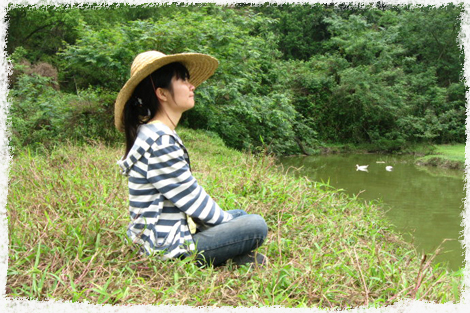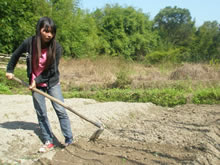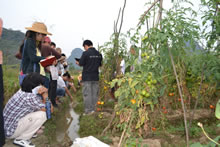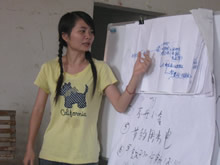 |
| Ou Shaomei reflects on her choice of being a social worker: “At the end of the day, what kind of life suits me better?” |
While many youngsters in Mainland China are fond of the bustling and flourishing city life, Ou Shaomei is going against the tide. She went to the countryside to enjoy the manual life of farming, and later even decided to give up her own career and engage in “community supported agriculture” (CSA). This move was driven mainly by her appreciation and youthful zest for village life, as well as a passion for supporting agriculture and farmers.
Ou Shaomei joined the CSA internship programme organized by Partnerships for Community Development (PCD) and graduated from the programme in summer 2012. CSA is a farming-and-food-consumption model in which small farmers practise eco-agriculture and provide farm produce to the nearby community. The farmers relinquish the use of pesticides and chemical fertilizers and sell produce directly to consumers, such that farmers and consumers understand, communicate with and support each other. In recent years, PCD has been promoting the CSA model in Mainland China and it has become increasingly popular across the country. PCD has also been arranging for young people to those farms, shops and restaurants practising CSA to learn how it operates.
Ou Shaomei, aged 25, was previously a social worker in China. She graduated from Guangdong Medical College, majoring in Psychology. She wanted to make use of the professional knowledge she'd gained to help those who suffer from psychological distress. However, she experienced a big change in direction after her friend introduced her to Ainong Hui [literally meaning the Love Farming Association] [1], an association in Liuzhou, Guangxi. The Association, which practises CSA model, purchases produce directly from farmers who reject pesticides, and the produce becomes food for a restaurant run by the Association named Tushengliangpin. Ou Shoamei, who grew up in the city, was enthralled by the farmers she got to know through Ainong Hui. The young farmers she chatted with, practising CSA in their 20s and 30s, talked heartily about the job they enjoyed so much. Ou Shaomei couldn't help asking herself, “How come there are such people in the world?”
Moreover, Ou Shaomei started to reflect on her choice of serving people by applying her knowledge of psychology. After experiencing village life, she witnessed the close relationship among rural people who care about each other. They were very highly friendly and affable. Ou Shaomei came to think thaqt normal life should be like that - people living in such atmosphere have no need of help from knowledge of psychology. Returning to urban life, Ou Shaomei saw only people tormented by work pressure, plotting against and alienated from each other. She considered it very abnormal and knew why urban people need psychiatrists. Furthermore, she saw that lots of social and psychological problems emerging in China’s rural areas are caused by the young leaving their home villages to seek jobs in big cities while only children and the elderly remain in the countryside. She could see that the roots of these problems, which actually relate to rural development and the rural-and-urban relationship, could not be fully resolved by psychology knowledge.
All these reflections have led Ou Shaomei to feel the importance of rural development. Also, she has fallen in love with rural life which is characterized by a strong human touch among people. She started to revisit her life's goals, asking herself: “What kind of living is most suitable to me?” At last she daringly decided to leave her profession as a social worker and started to engage in CSA. She partnered with a friend to establish an organization, named Xiangshankeng [2], to practise CSA in Zhongshan of Guangdong Province. They purchased organic vegetables from four farmers and then created a network of consumers. They delivered vegetables to the consumers using a bicycle. The top sales record was 40 catties of vegetables. The motive behind it was to improve farmers’ livelihoods. Ou Shaomei came to feel that she would, in her days ahead, engage in a career concerning the well-being of rural areas and farmers.
To enhance mutual understanding and support between farmers and consumers, Xiangshankeng organized various activities for consumers to experience farming work, such as making compost, sowing paddy rice seeds with children and adults together, releasing water from the paddy fields and catching Hehua fish (Procypris merus) in the field.
PCD supported Ou Shaomei to work as a CSA intern in Xiangshankeng where she is also the person in charge. Ou Shaomei has participated in lots of learning activities through running Xiangshankeng, such as going to the countryside to learn farming jobs, helping grow wheat and weeding. Later, as she wanted to raise the income earned by Xiangshankeng, she also learnt to hand-make soybean curds to sell.
However, Ou Shaomei was not very successful in expanding the number of farmers and consumers joining her CSA project; due to lack of experience, Xiangshankeng encountered financial difficulties. Thus Ou Shaomei has now suspended the operation of Xiangshankeng. But she didn't give up and is now developing strategies to re-launch her organization, such as turning Xiangshankeng into a restaurant, like Tushengliangpin run by Ainong Hui. She will then look for farmers to provide produce to the restaurant. She has also thought of her parents who are originated from rural areas, the land in her home village and also the many of her relatives who are farmers. All these conditions are conducive for her to form farmer network to provide her with food to sell in the near future.
Being a university graduate and having joined the profession of social work which offered her a good income, Ou Shaomei has been so determined to change her vocation to practise CSA; so far this has not been quite successful. It is natural for her to meet opposition from her parents, and her friends cannot understand her choice. However, CSA is something Ou Shaomei likes from the bottom of her heart. She said, “I have personally found it very enjoyable and meaningful. I do not do it out of a temporary craziness. You can see so many successful cases in practising CSA and so it will be nice for me to make this choice. I’m not thinking I’m great to participate in it. I do it only because I love it.”
During her practice of CSA through running Xiangshankeng, which was supported by PCD as a kind of CSA internship programme, Ou Shaomei has reflected on various values in modern life, including all sorts of problems arising from globalization and consumerism. She has felt the awesomeness of nature and hence she has become less obstinate in all matters. She was also deeply impressed by those youngsters choosing to return to their beautiful homeland to farm.
She has been inspired so much as to criticize the mainstream culture of the Western mode of development. She pointed out that popular magazines usually portray urban women as “elegant” through the images of them being from the middle class, trendy, with a cup of coffee in her hands, as opposed to rural women who are by no means elegant. Ou Shaomei challenges such portrayals, saying “A rural woman provide us with food through planting. She has knowledge of farming. She is leading a real life. But an urban woman lives outside real life because she doesn't even know where the food she eats everyday comes from - something closely linked with real life. So she doesn't live a remotely real life. It's a great loss for someone to lead such a life.”
For the purpose of “leading a real life” Ou Shaomei has chosen a career relating to farmland and farmers. She said, “It is a real life only if I make such a choice.”
- Ainong Hui was gradually developed by several people from Liuzhou, in Guangxi Zhuang Autonomous Region, who are fond of eating and shopping in rural areas. As they loved eating local rural produce and food so much they grouped together to go to the countryside to eat and later established Tushengliangpin as an exhibition hall selling eggs, noodles made from red potatoes, tea seed oil and charcoal from nearby farmers, as well as opening a CSA shop selling fusilli. Later, they also organized themed activities including food-tasting parties and meeting farmers. Tushengliangpin soon developed into a restaurant which supports CSA practised by youngsters, organizing activities such as farm produce fairs and rice noodle-making workshops, which enable small farmers to lead a self-sufficient life. (Read also: http://www.pcd.org.hk/csaconference/download/caseStudy04.pdf, Chinese only)
- Go to the Xiangshankeng blog (http://blog.sina.com.cn/u/2001508351) for details and read the article written by Ou Shoamei titled “Returning Home to Farm” at http://blog.sina.com.cn/s/blog_774c97ff01013j4r.html on her experience of a CSA internship (a version pending refinement). Text in both weblinks is in Chinese only.









